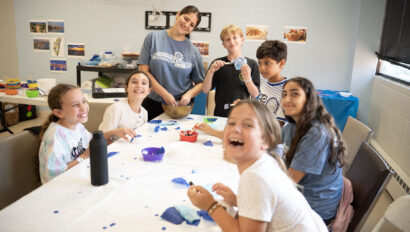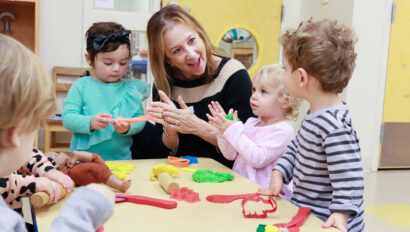Is Dinner Time a Struggle with Your Kids?
How many of you have said, “Don’t play with your food!” “Get your hands out of your food. You are going to make a mess!” “You can watch TV while you eat!” It may be time to change the conversation about food and meals.
Eating is the most complicated physiological human behavior, involving every organ system of the body. You probably don’t know this, but 26 muscles and 6 cranial nerves are needed to swallow. The most important determinant of a child’s liking for a particular food is the extent to which it is familiar. Familiarity is learned through repetition and play. (Cooke, 2007).
We know that children go through phases. We know that some children are picky about what they will eat and will ask their parents to make the same things over and over, often refusing to try new foods. We also know that some children look at the packaging of food and make their choices based on that. How often have you bought a different brand of yogurt, same flavor but in a different container, only to have it refused by your child?
In our society many experiences occur around food. Having a meal together as a family should be a pleasure and not a burden.
Some Simple Facts
- A child is more likely to eat a new food if an adult is eating the SAME food.
- Every meal can be a learning experience, particularly for the child who has food aversions.
- As a parent, be conscious of your position as a role model. Do you limit your own food intake? Only eat certain foods because of concern for maintaining your weight? Do you constantly talk about fat content? Do you talk negatively about meals and food? What you say about food and your food selections will impact your child. Be mindful as you model good eating habits and your child will follow your lead.
- Continue to introduce your children to new foods to expand their food repertoire. When offering a new food, be patient. The child needs to adapt to the new taste and the new texture. It may take as many as 15 tries before the new food is accepted.
How Can I Bring Structure to Mealtime?
- Let your child know that mealtime is coming. If your child is a fussy eater this may not be a pleasant announcement. You may want to let them know what is on the menu!
- Create a transition activity. Ask your child to wash their hands before dinner as a way of getting them to break away from a prior task.
- Consider a family-style serving. Let your child sit down to an empty plate and pass the food and make sure there are foods the child will put on their plate. This will allow the child to feel that they are able to make choices at the dinner table and gives them some control. If you are introducing a new food, provide an additional “learning plate.” Encourage the child to put a small piece of the new food on the learning plate.
- Encourage conversation about the food on the learning plate. This is the time to play with the food. Touch it! Smell it! Play with it! How does it feel? How does it smell? Can you touch it to your tongue? Let the child know “You don’t have to eat it!” If the child does try the new food and it is evident that he/she did not really enjoy eating it, provide a way he/she can spit it out.
- The ending routine. Throw the new, uneaten food into the trash.
- A mealtime rule of staying seated at the table until it’s cleanup time can be very effective.
Important Notes:
Higher levels of parental pressure to eat are associated with lower levels of interest on the part of the child. Rewards for eating may cause the child not to want to eat! Setting healthy eating patterns is key to ensuring that our children assume healthy habits and research shows that reward and punishment tactics are not effective.
Mealtime should be a daily highlight for your family, so make a point of making it enjoyable. Remove distractions like TV, toys and games! The topic at mealtime is food and if you make it an enjoyable time, having meals together will create special memories we all look to make as a family.
Hope you have a pleasant meal tonight!

Written by Anita Miller, M.S., OTR, Assistant Director of the Therapeutic Nursery at the JCC. She has a BS in education from Illinois State University, and a BS in Health Science and MS in Occupational Therapy from Mercy College


